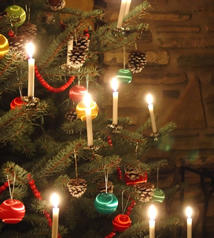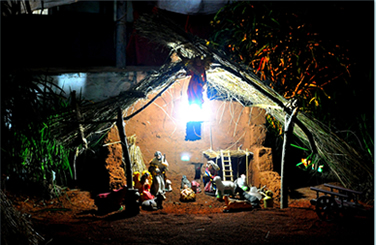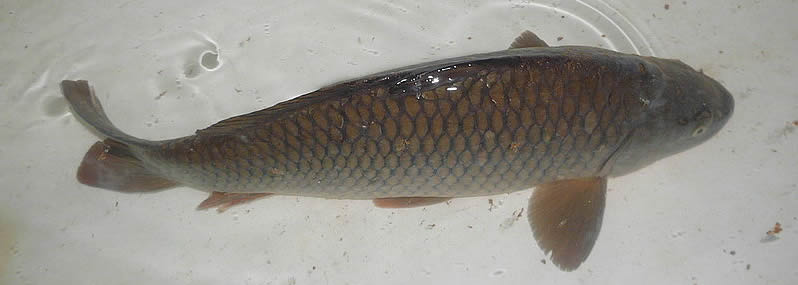Many of the Webcertain team won’t be spending Christmas in the UK – they’ll be flying off to join family and friends in their home countries. As we prepare for one of the biggest celebrations of the year, we wanted to take a look at how Christmas festivities vary around the world.
Christmas without Turkey
Unimaginable to many people in the UK, but not everybody sits down to a big Turkey dinner at Christmas. Roast meat is quite common but this would often be Duck, Goose or Capon – and various forms of potatoes and vegetables will be served.
Swedish households are more likely to have a Christmas buffet, which will consist of pickled Herring, Salmon and Meatballs and in Poland and the Czech Republic, Carp is the most likely dish you’ll see on the table. Interestingly, tradition states that families buy live Carp several days in advance and keep them swimming in the bath, until the time comes to cook them!
As well as the main meal, there are numerous different foods and drinks consumed. In Germany and Austria, special cookies will be homemade and shared amongst the family as well as traditional Stollen cake, while French revellers will enjoy Bûche de Noel – a dessert similar to a Yule log.
In Mexico, Christmas punch is very popular – a warm punch made with sugar, cinnamon and a variety of winter fruits including tejocotes, a locally-grown orange fruit which tastes similar to apples and pears.
Christmas in January
Unsurprisingly, as Christmas is celebrating the birth of Jesus on 25th December, there is little variation on when it’s celebrated. Here in the UK, our main celebration is 25th, while many countries, especially in Europe, the 24th December is the most important day, when families will gather in the evening for a big meal and gifts will be exchanged.
There are however a few exceptions. In Russia, for example, an Orthodox Christian country, Christmas will be celebrated on 7th January, on the day after Epiphany. This is a very religious festival with the focus being church services and family time.
Christmas on Fire
 Well, hopefully not – which is why families in Denmark, Germany and Austria, amongst others, will keep a bucket of water nearby when they light their Christmas tree. As instead of the common electric lights most of us choose, traditionally real candles will be placed on the tree and lit. For practicality (and health and safety!), this tradition might nowadays only be carried out on Christmas Eve during celebrations.
Well, hopefully not – which is why families in Denmark, Germany and Austria, amongst others, will keep a bucket of water nearby when they light their Christmas tree. As instead of the common electric lights most of us choose, traditionally real candles will be placed on the tree and lit. For practicality (and health and safety!), this tradition might nowadays only be carried out on Christmas Eve during celebrations.
Christmas Predictions
Some cultures use Christmas as a time to look to the future and make some predictions for the coming year. In the Czech Republic, rituals such as floating walnut shells in a bowl of water, and pouring melted lead into water are performed to determine if the year will bring happiness or bad luck.
An olden custom that has seen a recent revival in Russia is fortune telling for single girls. The pagan belief was that the dead tell the truth at Epiphany, so girls could find out if they will be married, and who their husband might be.
It is also a time when people wish for good luck in the coming year – in Poland this is done by placing some straw (to symbolise where Jesus was born) and some money underneath the tablecloth. Also, keeping a clean Carp shell in your wallet should help bring prosperity.
Christmas Crib Competitions
 While India is not a predominantly Christian country, there are regions with a larger Christian population who do celebrate Christmas. It is a religious festival and celebrations are very church oriented. One particular tradition in the Southern State of Kerala is to have crib and tree competitions where families will wander amongst all the entries on Christmas Eve and Christmas Day, some of which will have taken months to prepare, and will recreate the whole scene in Bethlehem. The winner will need to have done something really special.
While India is not a predominantly Christian country, there are regions with a larger Christian population who do celebrate Christmas. It is a religious festival and celebrations are very church oriented. One particular tradition in the Southern State of Kerala is to have crib and tree competitions where families will wander amongst all the entries on Christmas Eve and Christmas Day, some of which will have taken months to prepare, and will recreate the whole scene in Bethlehem. The winner will need to have done something really special.
People in other countries might not go to quite the same extent but the Nativity scene is still significant. In Italian homes, the nativity scene is more important than the Christmas tree, with more time and effort spent creating and decorating it. Baby Jesus, won’t appear until midnight on 25th, when the youngest member of the family will add him to the scene. This real-time enactment also happens in France, where the characters appear as they would have done at the time – meaning the Three Kings only show up on 6th January.
An Apple for Christmas
The majority of Chinese people don’t celebrate Christmas however recently it’s become common for young people to mark the occasion by giving each other apples on Christmas Eve. Shops will now sell apples which are gift-wrapped and decorated, and the reason for the choice of gift is that the word for Apple in Chinese sounds similar to the name given to Christmas Eve, which means Silent Night. Traditionally in many parts of Europe, Children were given Oranges at Christmas as they were seen as a luxury and not widely available all year.
Wherever and however you’re celebrating Christmas, we hope it’s a very happy one and wish you all the best for 2015! I’m off to buy a carp!
Image Credits 1 – Barta IV and 2 – Eustaquio Santimano










2 responses
Carp is one of the cheapest and the most not-tasty fish. But… this is a tradition and we have to eat it 😀
It’s funny how we all eat and drink things we don’t really like at Christmas, just because it’s a tradition! Enjoy your Carp Mick!